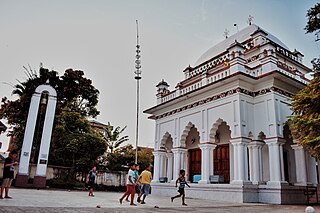Related Research Articles

Manipur is a state in northeastern India, with the city of Imphal as its capital. It is bounded by the Indian states of Nagaland to the north, Mizoram to the south and Assam to the west. It also borders two regions of Myanmar, Sagaing Region to the east and Chin State to the south. The state covers an area of 22,327 square kilometres (8,621 sq mi) and has a population of almost 3 million, including the Meitei, who are the majority group in the state, the Meitei Pangals, Naga tribes, Kuki/Zo tribes and other communities, who speak a variety of Sino-Tibetan languages. Manipur has been at the crossroads of Asian economic and cultural exchange for more than 2,500 years. It has long connected the Indian subcontinent and Central Asia to Southeast Asia, China, Siberia (Russia), Micronesia and Polynesia, enabling migration of people, cultures and religions.

The Meitei people are an ethnic group native to the state of Manipur in northeastern India. The Meitei primarily settled in the Imphal Valley region in modern-day Manipur, although a sizable population have settled in Assam, Tripura, Nagaland, Meghalaya and Mizoram; with notable presence in the neighbouring countries of Myanmar and Bangladesh. The Meitei ethnic group represents about 53% of Manipur's population.
The Meitei Christians are a Christian movement based in Manipur, in India.

Chinglen Nongdrenkhomba (1788–1834), also known as Raja Gambhir Singh, was a ruler of the Manipur Kingdom.
Marjit Singh was a Meitei royal who ruled Manipur between 1812 and 1819 as a vassal of Burma, but was eventually expelled by the Burmese. The Burmese devastated Manipur during a seven-year occupation that came to be known as Chahi-Taret Khuntakpa.

Tikendrajit Singh --also known as Koireng--was a prince of Manipur in present-day northeastern India, which was a protectorate of British Raj at that time. Tikendrajit was the commander of the Manipuri army and engineered a palace revolution that led to the events known as the Anglo-Manipur War of 1891 or the 'Manipur Expedition'.
The history of Manipur is reflected by archaeological research, mythology and written history. However, with the finding of old lost Puya called Wakoklon Heelel Thilel Salai Amailon Pukok Puya which was written around 1398 BCE at the time of King Mongyamba, the kings of Kangleipak need to be updated. Since ancient times, the Meitei people have lived in the valleys of Manipur alongside the highlanders in the hills and valley in peace. Pangal (Muslims) people settled in the valleys during the reign of Meidingu Khagemba in the year 1606. Since then, they also lived along with the Meitei.
Raja Surchandra or Surachandra Singh was a Manipuri King who ruled between 1886 and 1890. He became the Raja of Manipur in May, 1886 after his father Raja Chandrakirti Singh died.
Raja Chandrakirti, the son of Raja Gambhir Singh was a ruler of Manipur from 1850 to May 1886.

Mir Jumla II was a prominent subahdar of Bengal under the Mughal Emperor Aurangzeb.
Maharaja Kulachandra Singh was the son of Maharaja Chandrakriti Singh and he was the Maharaja of Manipur. On 21 February 1891 Lord Lansdowne, the British Viceroy of India ordered J.W. Quinton, the chief commissioner of Assam, to recognise Juvaraj Kulachandra as the king but to arrest Senapati Tikendrajit.

Nara Singh also known as Chingthanglen Pamheiba and Meetingu Lairen Nonglen Sendreng Manik Khomba, was a ruler of the Kingdom of Manipur. He ruled first as regent from 1834 to 1844 and then as king for a period of six years from 1844 to 1850. His subjects called him ‘Eningthou Nungsiba’ or ‘our beloved king’.

The Ningthouja dynasty comprises the descendants of the kings of Manipur. It has 125 extended families. It was the single ruling dynasty of the erstwhile kingdom of Manipur. It was one of the longest-lasting dynasties in the world. It was founded by King Nongda Lairen Pakhangba in 33 CE. The reign of Ningthouja Dynasty continued until the abolition of the privy purse and royal entitlements by then Prime Minister Indira Gandhi through a constitutional amendment in 1971.

The Manipur Kingdom or Kangleipak Kingdom or Manipoor Kingdom was an ancient independent kingdom in Asia that was in subsidiary alliance with British India from 1824, making it a princely state. It bordered Assam Province in the west and British Burma in the east, and in the 20th century covered an area of 22,327 square kilometres and contained 467 villages. The capital of the state was Imphal.
Rohinchandra, also known as Harshachandra Singh, Labeinya Chandra and Rabino Chandra was a Manipuri King who ruled between 1798 and 1801. He was the son of Bhagya Chandra.
Maharaja Sir Meidingngu Churachand, also known as Churachandra or Chura Chand (1886–1941), was installed as the Raja (ningthou) of Manipur after his predecessor Kulachandra was jailed. He was a 5-year-old boy when he was placed on the throne on 22 September 1891, after the troubles of the Anglo-Manipur War of 1891. In 1907, he was formally declared king, after completing education at Mayo College.
Maharaja Bodhchandra Singh or Bodhachandra Singh (1908–1955) was the last ruler of the Kingdom of Manipur. He ruled between 1941 and 15 October 1949. He married seven or nine women, his first wife being HH Srimati Maharani Tharendra Kishori, who died in 1942; she was daughter of the Raja of Bodo Khimedi.
Khangembam Mangi Singh, popularly known as Guru Pena Mangi, is an Indian musician, known for his expertise on the Manipuri traditional musical instrument Pena. The Government of India honored him in 2011, with the fourth highest civilian award of Padma Shri.
Ningthoukhongjam Khelchandra Singh was an Indian writer, lexicographer and historian, known as the author of Manipuri to Manipuri and English, the first modern general dictionary in Meitei language, which was published in 1964. He was a fellow of the Sahitya Akademi and Sangeet Natak Akademi. The Government of India awarded him the fourth highest civilian honour of Padma Shri in 1987.
Devendra Singh may refer to: